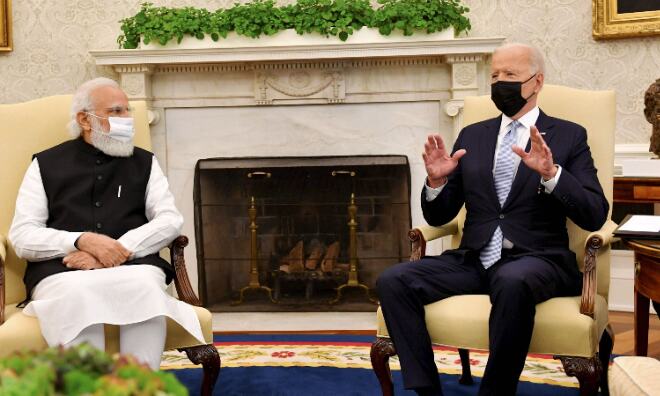Reaffirmation of ties
PM’ Modi's visit to the US encompassed bilateral and multilateral engagements with the host country in the trade and defence sector

Prime Minister Narendra Modi's sojourn to the United States last week comprised several engagements — bilateral, plurilateral and multilateral — with the United States, the United Nations and leaders from the Quad partners, along with interaction with global business CEOs as a throw-in.
Travelling overseas outside the neighbourhood for the first time since the outbreak of Covid-19, PM Modi made most of the four-day trip on India-One — the latest dedicated aircraft for top Constitutional functionaries in the country.
There are several takeaways from the September 22-25 visit to Washington DC and New York, starting with the India-United States bilateral ties — now characterised as Comprehensive Global Strategic Partnership — that encompasses some 50 sectors between space and sea.
The depth of the ties and its upward trajectory needed reaffirmation since there was a change of administration in the United States this year, with the veteran Democrat, Joseph R Biden, assuming charge as the President of the United States of America.
A sit-down meet between PM Modi and President Biden formalised the acquaintance the leaders had during the latter's tenures as the Vice President under President Barack Obama. Biden has been extremely well-versed in international affairs, in his previous Avatar as the Chairman of the powerful Senate Foreign Relations Committee. It is little wonder that after the bilateral meet, which stretched beyond the scheduled time, the President remarked that considering the vast sweep of engagement, it required at least two days to cover the entire gamut.
Equally important from the bilateral standpoint is taking forward the initial contact with Vice President Kamala Harris, whose grip on the Democratic Party, and more importantly the Progressive section, has been significant. Harris, born to an Indian mother and Jamaican father, never hid her connection with India and deep ties with her maternal grandfather and the family. Yet, in her previous role as an influential senator in the US Congress, she remained a vocal critic of some of the policies of the Government of India.
It was time to move forward since, as a Deputy to President Biden, she works on important portfolios of preparing for responses in the post-pandemic era while also working on immigration policy that has entangled several successive administrations.
Despite the extensive reportage of the bilateral talks with thousands of words written or spoken on the momentum these ties acquired, there are a few tripwires that both sides would have to negotiate. The first comes in the form of the trade deal, an issue that blew up during the previous President Donald Trump regime. Although there are indications that the ministers on either side will earnestly work on it, the political atmosphere in the United States continues to face the overhang of the 'America First' policies of President Trump.
Both sides will have to find a ground that appears fair amid the pressure on the Biden administration to balance the aggressive push of the Republicans and the pull from the progressive section within his Democratic party.
The progressives, who enjoy the tacit support of Kamala Harris, are an influential voice within the Democratic Party set-up and, interestingly, two of the four India-American members in the House of Representatives — Pramila Jayapal (Democrat from Washington State) and Rohit 'Ro'Khanna (Democrat from California) — are the leading voices, both as Progressives and inside the party.
They, along with other members, should play a significant role on the issue of the S-400 Missiles deal India has with Russia under the CAATSA law requiring the imposition of sanctions on a country that acquires this weapon system unless there is a presidential waiver.
PM Modi mentioned the five Ts in bilateral relations — Tradition, Talent, Technology, Trade and Trusteeship. These should strengthen the ties from the Trump era's transactional to a transformational phase once again.
Quad formulation
The first in-person Summit meeting after the Covid outbreak generated excitement when announced but, in the run-up to the actual meet, some of its sheens was shorn as the United States announced a military alliance with the United Kingdom and Australia, known as AUKUS. With both the US and the UK working in tandem and planning to equip Australia with nuclear submarines is a message to China.
The strategic community is divided on how this arrangement would translate for the world in general and those in the Indo-Pacific region in particular. In a way, the military alliance of these three countries can be interpreted as furthering India's standpoint that Indo-Pacific and Quad are essentially a geo-economic construct. Amid nagging doubt whether the joint military exercises meant the formation of a geo-strategic arrangement can be put to rest with this new military alliance.
The Quad leaders' statement, while taking an overarching view, decided to focus on the immediate management of the global health pandemic by becoming a major vaccine supplier in the Indo-Pacific region — a move that has the potential to check the presence of China in this sphere.
Views expressed are personal



